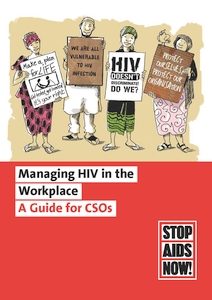STOP AIDS NOW! commissioned me to research and write this handbook (which they translated into French) to help organisations reduce the effects of HIV on their staff and their work. Other terms for this include ‘internal mainstreaming’ or ‘mainstreaming HIV at the organisational level’ or ‘addressing HIV in the workplace’.
Extract
The costs and benefits of managing HIV
Of course, managing HIV in the workplace is not free of cost.
One cost is the staff time your CSO will use to come up with plans, and to put them into action. You may also need extra money, for example, if your CSO hires trainers to help you run workshops, or helps with the insurance or medical costs for staff.
The actual costs in time and money vary a lot between CSOs in different countries. But whatever they are, you might think that ignoring HIV has to be cheaper, because that doesn’t cost anything. Yet in the case study on page 7, when the CSO ignored HIV the consequences included: staff away from work; a failing project; the death of a valued member of staff; misuse of resources; management stress; a sacked member of staff; loss of a donor; underperforming staff; and bad feelings among staff. The costs of the consequences of doing nothing can be substantial.
We don’t have much information on the costs and benefits of managing HIV in the CSO sector. Many CSOs don’t record sick leave, and CSOs’ outputs are often hard to measure. But recent research among companies in Zambia showed that, on average, the benefits of managing HIV were three times the costs. So for every kwacha (or dollar) spent, they saved three.
It is no coincidence that businesses were the first organisations to manage HIV. They are very sensitive to higher costs and reductions in productivity because they mean lower profits. Many businesses have recognised that it is cheaper to manage HIV than to ignore it. This is also the experience of many of the CSOs supported by STOP AIDS NOW!’s projects in Uganda, Ethiopia and India. They have found that investing some time and money now allows them to get benefits now, and to avoid higher costs in the future.
So, managing HIV within organisations is cost-effective. It is also necessary, particularly in places with high HIV prevalence, if your organisation is to protect its ability to deliver its outputs.
CSOs that have chosen to manage HIV report various benefits. These include:
- Staff are better informed, and more able to talk about HIV and sexuality issues;
- There is less stigma and discrimination in the workplace;
- Staff feel more confident that they can keep their job if they are HIV-positive, and are more willing to disclose their status;
- More staff and their family members get tested for HIV (in STOP AIDS NOW!’s Uganda project, 65% of CSO staff had tested, compared to 13% of the population);
- Staff report safer sexual behaviour, so are less likely to get infected with HIV;
- More HIV-positive staff link to positive living networks, prevent opportunistic infections and use ART, so have better health and longer lives;
- Staff become more gender sensitive leading to less discrimination against women and transgendered members of staff;
- Staff feel more valued and, through participatory approaches, have a greater sense of togetherness;
- Staff capacity is enhanced, and the organisation is stimulated to improve its work by adapting its programmes to take account of HIV, or by doing AIDS work;
- The positive effects spill over to family members and the wider community.
